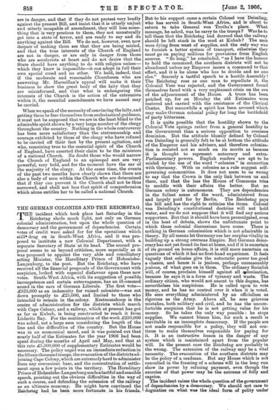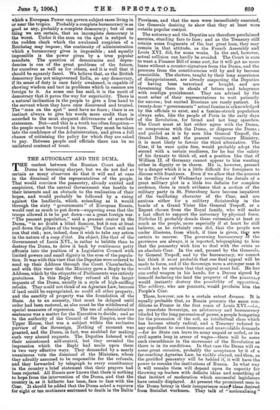THE GERMAN COLONIES AND THE REICHSTAG. T HE incident which took
place last Saturday in the Reichstag sheds much light, not only on German colonial administration, but upon the whole question of democracy and the government of dependencies. Certain votes of credit were asked for for the operations which still* drag on in South-West Africa, and it was pro- posed to institute a new Colonial Department, with a separate Secretary of State' at its head. The second pro- posal seems to us beyond criticism, more especially as it was proposed to appoint the very able and conciliatory acting Minister, the Hereditary Prince of Hohenlohe- Langenburg, to the post. But the Reichstag, who have received all the financial proposals of the Government with suspicion, looked with especial disfavour upon these new votes. South-West Africa, with its suggestion of possible incompetence and certain extravagance, has an ill-omened sound in the ears of German Liberals. The first vote— £525,000 as an indemnity for ruined colonists—was cut down promptly to £25,000, and limited to those who intended to remain in the colony. Keetmanshoop is the centre of administration for the districts which march with Cape Colony, and a railway, which at present has got as far as Kubub, is being constructed to reach it from Luderitz Bay. For the continuation of the work £250,000 was asked, not a large sum considering the length of the line and the difficulties of the country. But the House was in an economical mood, and it was pointed out that nearly half of the Estimates for the year 1906 had been spent during the months of April and May, and that at this rate £5,000,000 of supplementary Estimates would be necessary. The policy urged was an immediate reduction in the fifteen thousand troops, the evacuation of the districts ad- joining Cape Colony, which are extremely hard to administer from any convenient base, and the concentration of settle- ment upon a few points in the territory. The Hereditary Prince of Hohenlohe-Langenburg made %tactful and sensible speech, pointing out the obvious difficulties in the way of such a course, and defending the extension of the railway as an ultimate economy. He might, have convinced the Reichstag had he been more fortunate , in his friends. But to his support came a certain Colonel von Deimling, who has served in South-West Africa, and is about to return to take General von Trotha's place. What message, he asked, was he carry to the troops ? Was he to tell them that the _Reichstag had decreed that the railway should be left stuck in the mud at Kubub ? The men were dying from want of supplies, and the only way was to furnish a better system of transport, otherwise they must go on paying millions for provisions from English sources. " So long," he co'ncluded, " as I have the honour to hold the command, the southern districts will not be abandoned unless my Emperor issues a command to that effect, and it is he alone who has to decide and no one else." Scarcely a. tactful speech to a hostile Assembly ! The Reichstag rose as one man to repudiate it, the Colonial Vote was rejected, and the Government found themselves faced with a very unpleasant crisis on the eve of the adjournment of the House. A truce has been patched up, for on Monday the old Estimates were restored and carried with the assistance of the Clerical Centre. But meanwhile a spirit has been aroused which may make German colonial policy for long the battlefield of party bitterness.
It is quite possible that the hostility shown to the Colonial Vote springs rather from a general hostility to the Government than a serious opposition to overseas dominion. •But the attitude bluntly defined by Colonel von Deimling is generally felt to be at bottom the attitude of the Emperor and his advisers, and therefore colonisa- tion is resisted not so much on its merits as because it is thought to represent autocracy and extra- Parliamentary powers. English readers are apt to be misled by the use of the word " colonies " in connection with Germany. With us colonies as a rule suggest self- governing communities. It does not seem to us wrong to say that the Crown is the only link between us and them, and that the less the House of Commons tries to meddle with their affairs the better. But no German colony is autonomous. They are dependencies in the fullest sense of the word, administered from and largely paid for by Berlin. The Reichstag pays the bill and has the right to criticise the items. Colonel von Deimling's constitutional doctrine will not hold water, and we do not suppose that it will find any serious supporters. But that it should have been promulgated, even in the heat of debate, shows the unfortunate point to which these colonial discussions have come. There is nothing in German colonisation which is not admirable in theory. By all means let Germany use her surplus vitality in building up a strong overseas Empire. But German demo- cracy has not yet found its feet at home, and if it is uncertain of its ground on home affairs, it is still more uncertain on questions of which it hail no first-hand experience. It feels vaguely that colonies give the autocratic power too good a chance, and hence it is jealous, perhaps unreasonably jealous, of what goes on in them. The ordinary Socialist will, of course, proclaim himself against all eplonisation, because he says it is a form of tyranny and waste. The ordinary citizen, who would not assent to this dogma, has nevertheless his suspicions. He is called upon to vote money, and he has no control over it when it is voted. He sees everything administered by an officialism as rigorous as the Army. Above all, he sees grievous mistakes, both military and civil, and he has the uncom- fortable suspicion that he is not getting value for his money. So he takes the only way possible : he stops supplies. We cannot blame him, for such a result is inevitable in an incomplete democracy. If the people are not made responsible for a policy, they will not con- tinue to make themselves responsible for paying for it. It is an instructive lesson in the danger of any system which is maintained apart from the popular will. In the present case the Reichstag are probably in the wrong. The extension of the railway may be a vital necessity. The evacuation of the southern districts may be the policy of a madman. But any House which is not consulted in the framing of a scheme will in the long run show its power by refusing payment, even though the exercise of that power may be the extreme of folly and caprice.
The incident raises the whole question of the government of dependencies by a democracy. We should not care to dogmatise- on what was the ideal form of polity under' which a European Power can govern subject races living in or near the tropics. Probably a complete bureaucracy is as good as any, probably a complete democracy; but of one thing we are certain, that an incomplete democracy is the worst. Under it the man on the spot is subject to the sudden check which the awakened suspicion of a Reichstag may impose; the continuity of administration which a bureaucracy gives is impossible ; and equally impossible is the power given by a true popular mandate. The question of democracies and depen- dencies is one of the great problems of the future, for ourselves as well as for others, and it is well that it should be squarely faced. We believe that, as the British democracy has not misgoverned India, so any democracy, if its sense of duty is once fairly awakened, is capable of showing wisdom and tact in problems which in essence are foreign to it. As some one has said, it is the merit of democracy that it paves the way for superiority. There is a natural inclination in the people to give a free hand to the servant whom they have once discovered and trusted.. The " man on the spot " need have no fears ; there is an instinct always to give his words more credit than is accorded. to the most eloquent deliverances of armchair statesmen. But—and this is a truth too often forgotten— the people must be trusted in turn. They must be taken into the confidence of the Administration, and given a full chance of criticising the policy for which they are asked. to pay. Between people and officials there can be no unilateral contract of trust.







































 Previous page
Previous page